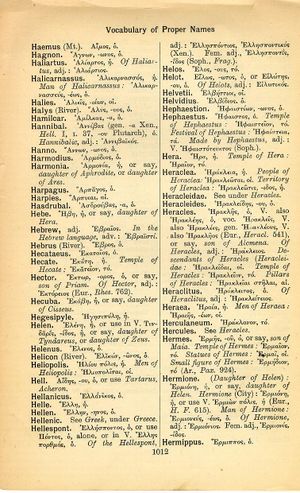Hecuba: Difference between revisions
From LSJ
Ubi idem et maximus et honestissimus amor est, aliquando praestat morte jungi, quam vita distrahi → Where indeed the greatest and most honourable love exists, it is much better to be joined by death, than separated by life.
(D_4) |
(Gf-D_4) |
||
| Line 1: | Line 1: | ||
{{WoodhouseENELnames | {{WoodhouseENELnames | ||
|Text=[[File:woodhouse_1012.jpg|thumb|link= | |Text=[[File:woodhouse_1012.jpg|thumb | ||
|link={{filepath:woodhouse_1012.jpg}}]]Ἑκάβη, ἡ, or say, <b class="b2">daughter of Cisseus.</b> | |||
}} | }} | ||
{{Lewis | {{Lewis | ||
| Line 6: | Line 7: | ||
}} | }} | ||
{{Gaffiot | {{Gaffiot | ||
|gf=<b>Hĕcŭba</b>,¹² æ <b>(-bē</b>, ēs<b>)</b>, f. (Ἑκάβη), Hécube, femme de Priam : Cic. Tusc. 3, 63 ; Virg. En. 2, 501 || fig. = femme vieille : Mart. 3, 76, 4. | |gf=<b>Hĕcŭba</b>,¹² æ <b>(-bē</b>, ēs<b>)</b>, f. (Ἑκάβη), Hécube, femme de Priam : Cic. Tusc. 3, 63 ; Virg. En. 2, 501 || fig. = femme vieille : Mart. 3, 76, 4.| | ||
|fig.=femme vieille : Mart. 3, 76, 4. | |||
}} | }} | ||
Revision as of 07:39, 14 August 2017
English > Greek (Woodhouse)
Ἑκάβη, ἡ, or say, daughter of Cisseus.
Latin > English (Lewis & Short)
Hĕcŭba: ae, and Hĕcŭbē, ēs, f., = Ἑκάβη,
I the daughter of Dymas, wife of Priam; after the destruction of Troy the slave of Penelope, changed through rage into a dog, Verg. A. 2, 501; 515; Ov. M. 13, 423; 549 sq.; 577; Cic. Tusc. 3, 26, 63; id. Fat. 15, 34.—Transf., an ugly old woman (opp. to Andromache), Mart. 3, 76, 4.
Latin > French (Gaffiot 2016)
Hĕcŭba,¹² æ (-bē, ēs), f. (Ἑκάβη), Hécube, femme de Priam : Cic. Tusc. 3, 63 ; Virg. En. 2, 501 || fig. = femme vieille : Mart. 3, 76, 4.

